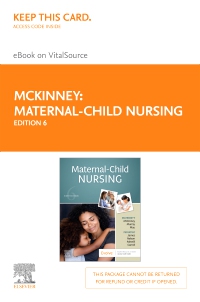
Maternal-Child Nursing - Elsevier eBook on VitalSource (Retail Access Card), 6th Edition
Elsevier eBook on VitalSource - Access Card

Introduce your students to the science and art of maternity and pediatric nursing! Maternal-Child Nursing, 6th Edition makes it easy to understand the essentials of women’s health, maternity, and children’s nursing care. It simplifies the steps of the nursing process and relates them to care, helping students develop clinical judgment skills and provide safe, effective care in evidence-based practice. Because it combines maternity and pediatric content into a single text, this book is ideal for programs without the two separate courses. In addition, active learning tools on the Evolve website allow students to apply their knowledge to the practice setting.
-
- NEW! Next Generation NCLEX® (NGN) examination-style case studies expose students to how content will be tested in the exam; case studies are either single-situation or unfolding studies
- NEW! Updated Drug Guides summarize the latest information on medications
- Nursing Care Plans help students apply the nursing process to plan individualized care in the most common maternity and pediatric situations
- Clinical Reference sections in pediatrics chapters provide basic information on disorders and their related anatomy and physiology, differences in body systems between children and adults, commonly used drugs, lab values, diagnostic tests, and procedures
- Clinical Judgment boxes highlight situations designed to test clinical judgment skills
- Health Promotion boxes highlight information needed to perform a comprehensive assessment of well infants and children at various ages
- Safety Alerts emphasize what is important to remember when providing safe and optimal quality care
- Pathophysiology boxes present an illustrated overview of illnesses and how to manage them
- Want to Know boxes provide teaching guidelines, including sample answers for questions that are likely to be asked or topics that need to be taught
- Communication Cues offer practical tips for verbal and nonverbal communication with patients and families
- Glossary at the end of the book gives students quick access to all key terms and definitions
-
- NEW! Next Generation NCLEX® (NGN) examination-style case studies expose students to how content will be tested in the exam; case studies are either single-situation or unfolding studies
- NEW! Updated Drug Guides summarize the latest information on medications
-
Unit I: Introduction to Maternal-Child Health Nursing
1. Foundations of Maternity, Women’s Health, and Child Health Nursing
2. The Nurse’s Role in Maternity, Women’s Health, and Pediatric Nursing
3. The Childbearing and Child-Rearing Family
4. Communicating with Children and Families
5. Health Promotion for the Developing Child
6. Health Promotion for the Infant
7. Health Promotion During Early Childhood
8. Health Promotion for the School-Age Child
9. Health Promotion for the Adolescent
10. Heredity and Environmental Influences on Development
Unit II: Maternity Nursing Care
11. Reproductive Anatomy and Physiology
12. Conception and Prenatal Development
13. Adaptations to Pregnancy
14. Nutrition for Childbearing
15. Prenatal Diagnostic Tests
16. Giving Birth
17. Intrapartum Fetal Surveillance
18. Pain Management for Childbirth
19. Nursing Care During Obstetric Procedures
20. Postpartum Adaptations
21. The Normal Newborn: Adaptation and Assessment
22. The Normal Newborn: Nursing Care
23. Newborn Feeding
24. The Childbearing Family with Special Needs
25. Pregnancy-Related Complications
26. Concurrent Disorders During Pregnancy
27. The Woman with an Intrapartum Complication
28. The Woman with a Postpartum Complication
29. The High-Risk Newborn: Problems Related to Gestational Age and Development
30. The High-Risk Newborn: Acquired and Congenital Conditions
31. Management of Fertility and Infertility
32. Women’s Health Care
Unit III Pediatric Nursing Care
33. Physical Assessment of Children
34. Emergency Care of the Child
35. The Ill Child in the Hospital and Other Care Settings
36. The Child with a Chronic Condition or Terminal Illness
37. Principles and Procedures for Nursing Care of Children
38. Medication Administration and Safety for Infants and Children
39. Pain Management for Children
40. The Child with a Fluid and Electrolyte Alteration
41. The Child with an Infectious Disease
42. The Child with an Immunologic Alteration
43. The Child with a Gastrointestinal Alteration
44. The Child with a Genitourinary Alteration
45. The Child with a Respiratory Alteration
46. The Child with a Cardiovascular Alteration
47. The Child with a Hematologic Alteration
48. The Child with Cancer
49. The Child with an Alteration in Tissue Integrity
50. The Child with a Musculoskeletal Alteration
51. The Child with an Endocrine or Metabolic Alteration
52. The Child with a Neurologic Alteration
53. Psychosocial Problems in Children and Families
54. The Child with a Developmental Disability
55. The Child with a Sensory Alteration







 as described in our
as described in our 